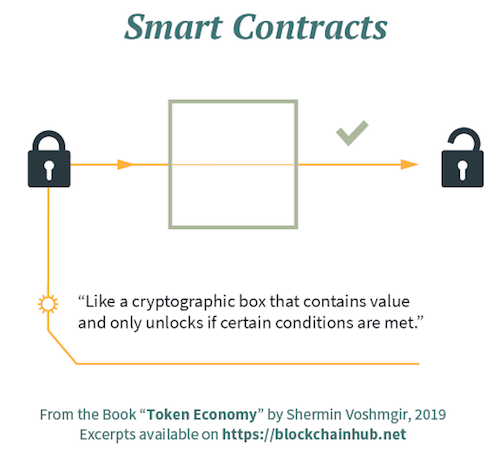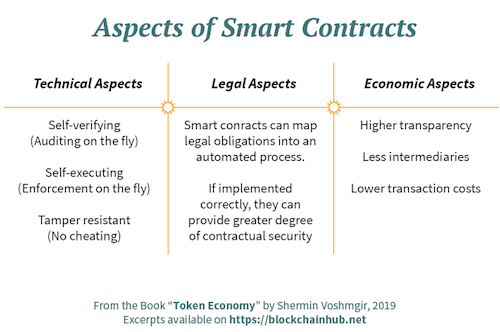Smart Contracts
A smart contract is a self-enforcing piece of so ware that is managed by a P2P network of computers. Smart contracts are e cient rights management tools that provide a coordination and enforcement fra- mework for agreements between network participants, without the need of traditional legal contracts. They can be used to formalize simple agreements between two parties, the bylaws of an organiza- tion, or to create tokens.
Would you enter into a contract with someone whom you’ve never met, and therefore don’t know and don’t trust? Would you become an investor in a small company in a foreign country? Would you agree to lend money to a stranger, like a farmer in Guatemala, a teacher in China, or to a cashier in the UK? Or would you set up a legally binding contract for a 1 EUR-purchase over the Internet, like buying a song from an artist?
The answer in all of the above-mentioned cases is probably no, as the cost of setting up the necessary legal contract to secure your transaction is too high. We either don’t enter into such a contract at all or use trusted intermediaries to settle such contracts, paying them substantial settlement fees for their services.

In the Internet we use today, the business models and “raison d’etre” of many tech giants like Amazon, eBay, Airbnb, Uber, etc. result from the lack of such a trustful native settlement layer (read more: Part 1 – Web3). Smart contracts provide a solution to exactly that problem. They can formalize the relationships between people and institutions and the assets they own over the Internet, entirely P2P, without the need for trusted intermediaries. Although the concept of smart contracts is not new, blockchain technologies seem to be the catalyst for smart contract implementation. A more primitive form of a smart contract is a vending machine. The rules of a transaction are programmed into a machine.
You select a product by pressing a number related to that product, insert the coins, and the machine acts as a smart contract by checking whether you inserted enough money. If yes, the machine is programmed to eject the product, and if you inserted too much money, it will also eject the change. If you didn’t insert enough money, you wouldn’t get the product, or if the machine ran out of money, you would not get your change back. Automatic vending machines not only slashed transaction costs by making dedicated stores obsolete, but they also expanded service, offering 24/7 availability instead of limited opening hours of a kiosk.
Self-Enforcing Agreements
A smart contract is a self-enforcing agreement embedded in computer code managed by a blockchain. The code contains a set of rules under which the parties of that smart contract agree to interact with each other. If and when the predefined rules are met, the agreement is automatically enforced. Smart contracts provide mechanisms for efficiently managing tokenized assets and access rights between two or more parties. One can think of it like a cryptographic box that unlocks value or access, if and when specific predefined conditions are met. The underlying values and access rights they manage are stored on a blockchain, which is a transparent, shared ledger, where they are protected from deletion, tampering, and revision. Smart contracts, therefore, provide a public and verifiable way to embed governance rules and business logic in a few lines of code, which can be audited and enforced by the majority consensus of a P2P network.


A smart contract can be invoked from entities within (other smart contracts) and outside (external data sources) the blockchain. Among these entities, the so-called “oracles” inject data that is relevant to the smart contract from the on-chain world into the smart contract information store. If implemented correctly, smart contracts could provide transaction security superior to traditional contract law, thereby reducing coordination costs of auditing and enforcement of such agreements. They can track the performance of the agreement in real-time and can, therefore, save costs, as compliance and controlling happens on the fly. Smart contracts reduce the transaction costs of agreements by orders of magnitude; specifically, they reduce the costs of (I) reaching an agreement, (II) formalization, and (III) enforcement. Smart contracts also bypass the so-called principal-agent dilemma15 of organizations, providing more transparency and accountability, and less bureaucracy (read more: Part 2 – Institutional Economics of DAOs).
The term “smart contract” itself is a bit unfortunate, since smart contracts are neither particularly smart nor are they to be confused with a legal contract: (I) A smart contract can only be as smart as the people coding it, taking into account all available information at the time of coding; (II) While smart contracts might have the potential to enforce legal contracts if certain conditions are met, we first need to resolve many techno-legal questions which will require time and interdisciplinary discourse between lawyers and so ware developers.
Furthermore, smart contract security is still an issue that needs to be resolved on a technical level. We will also need to be able to implement more sophisticated contractual clauses, including decentralized dispute settlement tools. While such developments might take more time to mature, some interesting dispute resolution solutions are already under development, examples of which are “Kleros,” “Openlaw,” or “Jur.” We will probably see a fusion of legal contracts and smart contracts emerge over the next few years as the technology becomes more mature and widespread, and as legal standards are adopted. However, we currently still lack best practices, and will probably need some time to go through a collective learning phase.
Use Cases
Smart contract use cases range from simple to complex. They can be used for simple economic transactions like sending money from A to B. Smart contracts can also be used for registering any kind of ownership and property rights, like land registries and intellectual property, or managing smart access control for the sharing economy. Smart contracts have the potential to disrupt many industries. Use cases can be found in banking, insurance, energy, e-government, telecommunications, music industry, art, mobility, education, and many more.


With smart contracts, every agreement, every process, task, and payment can have a digital record and signature that could be identified, validated, stored, and shared. Time-stamping services like “Bernstein” (patent registry), or governmental and semi-governmental registries (land titles, birth certi cates, school and university degrees), are examples for simple technological use cases. While time-stamping services are simple to implement on a technical level, the regulatory aspects of such use cases might be much more complex, depending on the type of industry and specific use-case. Smart contracts can furthermore be used for much more complex agreements between a multitude of actors, along the supply chain of goods or services, or for governing a group of people that share the same interests and goals without the need of traditional centralized institutions. Decentralized Autonomous Organizations (DAOs) are such an example and probably represent the most complex smart contracts. The smart contract hereby formalizes the governance rules – the bylaws, governing statutes, rules of procedure, or articles of association of an organization – and replaces day-to-day operational management with self-enforcing code.
Trending Technologies 2020
Why SAFEBOXTM Document Sharing is Ideal for Your Professional Needs
As a notary public, you are tasked with handling numerous legal procedures, each involved with different types of documents. Without a legitimate document sharing platform, your job can become tiring due to a lack of an efficient file sharing technique. Furthermore,...
Easy Document Sharing for Notary Publics with SAFEBOXTM
SAFEBOXTM gives you a platform to handle all your document sharing responsibilities hassle-free. It's easy, fast, secure, and reliable. As a notary public, you get to deal with sensitive information daily. SAFEBOXTM ensures that all your data is secure from...
Trends in Document Sharing Technology
The world is undergoing a fast-paced change in technology, which is revolutionizing how things around us work. In particular, the 21st century has seen a proliferation in smart devices, with new inventions coming up every day. One factor that has been subject to...
Security Issues with Document Sharing Technologies
Today, the corporate world is undergoing a swift change in operations, a feat that has been greatly influenced by technological advances. Employees are using different techniques to transfer important documents to clients and fellow workers. This has revolutionized...
How Can Blockchain Technology Improve Data Storage?
Decentralized Cloud Storage Cloud storage systems maintain data on remote servers that are accessible from the internet. However, unlike conventional cloud servers, decentralized cloud storage does not keep user data on a single centralized server. A decentralized...
Our Latest Updates

Why SAFEBOXTM Document Sharing is Ideal for Your Professional Needs
As a notary public, you are tasked with handling numerous legal procedures, each involved with different types of documents. Without a legitimate document sharing platform, your job can become tiring due to a lack of an efficient file sharing technique. Furthermore,...
Easy Document Sharing for Notary Publics with SAFEBOXTM
SAFEBOXTM gives you a platform to handle all your document sharing responsibilities hassle-free. It's easy, fast, secure, and reliable. As a notary public, you get to deal with sensitive information daily. SAFEBOXTM ensures that all your data is secure from...
Trends in Document Sharing Technology
The world is undergoing a fast-paced change in technology, which is revolutionizing how things around us work. In particular, the 21st century has seen a proliferation in smart devices, with new inventions coming up every day. One factor that has been subject to...





